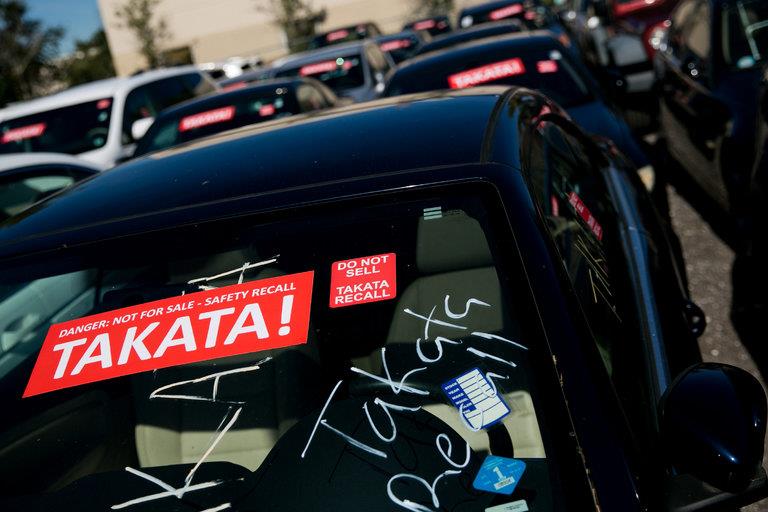
 Cars that were traded in during the Takata recall in a car lot in West Palm Beach. Fla , in January.
Cars that were traded in during the Takata recall in a car lot in West Palm Beach. Fla , in January.
Scott McIntyre for The New York Times
The legal battle over the deadly flaws in Takata airbags moved a step closer to resolution on Thursday when four automakers agreed to compensate owners of recalled cars. Under a proposed settlement in a class-action case, Toyota, BMW, Subaru and Mazda are set to pay a total of $553 million to current and former owners and lessees of 15.8 million vehicles. The money is meant to reimburse them for car rentals or other expenses — like lost wages, towing charges or child care — incurred while waiting for their cars to be repaired.
The agreement, filed in United States District Court in Miami, is subject to court approval.
But the process of fixing the tens of millions of cars equipped with the rupture-prone airbags will drag on for years. Replacement parts remain in short supply, and many consumers have been unresponsive to recall notices.
Some of the money in the proposed settlement will be used to encourage consumers whose cars are under recall to bring them to dealers for repair. So far the airbags have been replaced in fewer than a third of the affected Toyota and Subaru vehicles and fewer than a fifth of those from BMW and Mazda.
“Many consumers are unaware of the dangers their vehicles pose,” Peter Prieto, a partner at the law firm Podhurst Orseck who served as the lead counsel in the class-action case, said in a conference call with reporters. “It will take years to complete the recalls.”
Mr. Prieto is involved in similar economic-loss claims against Ford, Nissan and Honda. He declined to say if a settlement was being discussed with those automakers.
The inflaters developed by Takata use a compound known as ammonium nitrate that is supposed to fill airbags in a powerful but controlled explosion. When exposed to air or moisture over long periods of time, however, it can become unstable and explode more violently than intended. Takata airbags have been linked to at least 11 deaths and more than 180 injuries.
Takata and other suppliers have been making replacement inflaters for years. But the task is enormous because 42 million vehicles with Takata inflaters were sold in the United States.
Doug Waikem, owner of a Subaru franchise and six other dealerships in Massillon, Ohio, said the scope of the problem was hard to fathom. About 21,000 cars sold by his dealerships alone need replacement airbags, and part deliveries are sporadic. When a shipment is due, his staff contacts owners by phone, email or letter to encourage them to come in.
“A lot of people here just don’t respond,” he said. “It’s frustrating.”
Under the provisionary settlement, Toyota agreed to pay $278.5 million, BMW $131 million, Mazda $75.8 million and Subaru $68.3 million. The automakers agreed to provide rental cars to owners most at risk, including those with older vehicles or living in humid areas like the Southeast or Hawaii.
The settlement will also provide funds for an effort to urge owners — through phone calls, email, social media and direct mail — to have their cars repaired.
It does not cover personal injuries claims related to the airbags.
Takata and its largest customer, Honda, first noted violent airbag ruptures more than a decade ago but failed to initiate recalls or notify safety regulators. Takata was later found to have manipulated and destroyed testing data related to its inflaters, and for a time it blamed limited manufacturing errors for the explosions.
The first recall, in 2008, affected only 4,000 cars.
In February, Takata pleaded guilty to fraud charges, acknowledging that it had provided false safety test data. The company agreed to provide $875 million to compensate automakers for costs related to recalls, and $125 million for people killed or injured.
The Justice Department has also filed criminal charges against three Takata executives. Those cases
are pending.